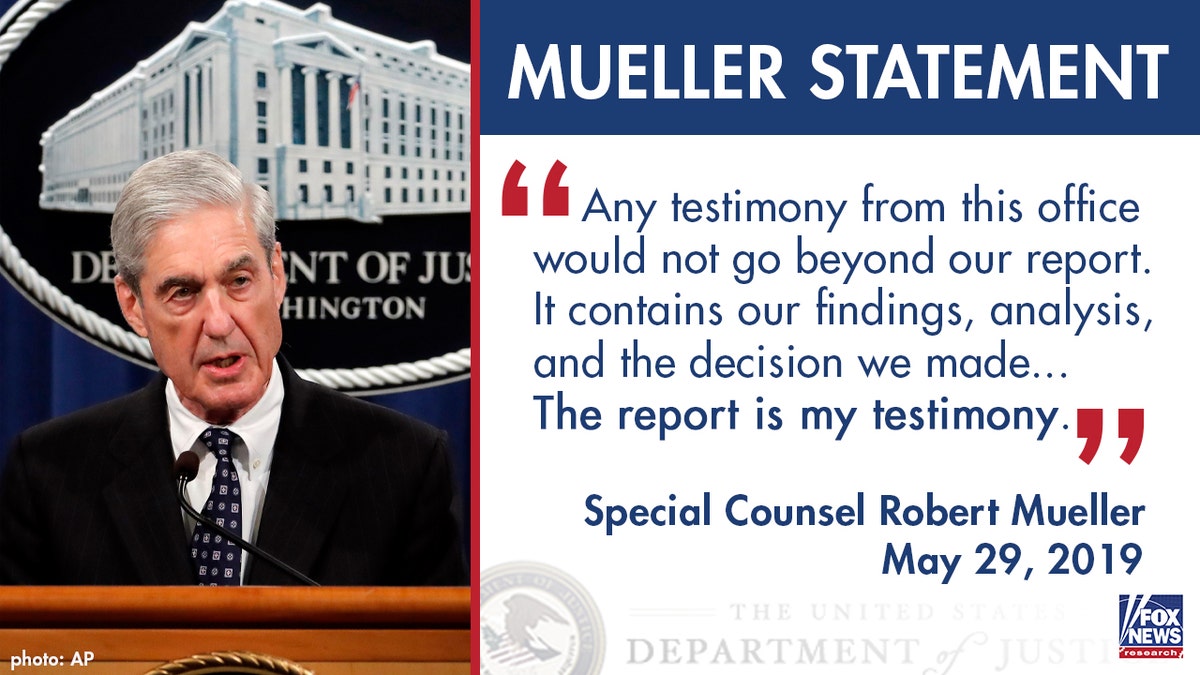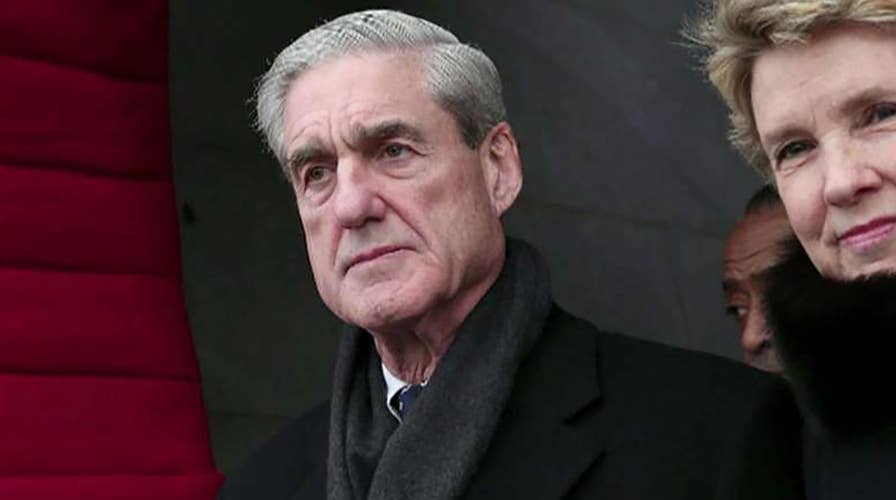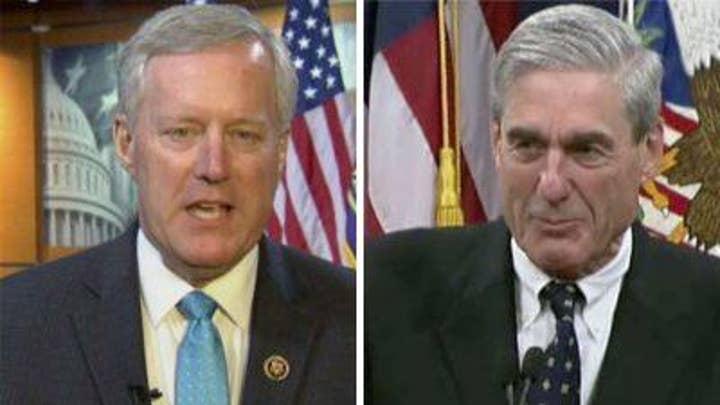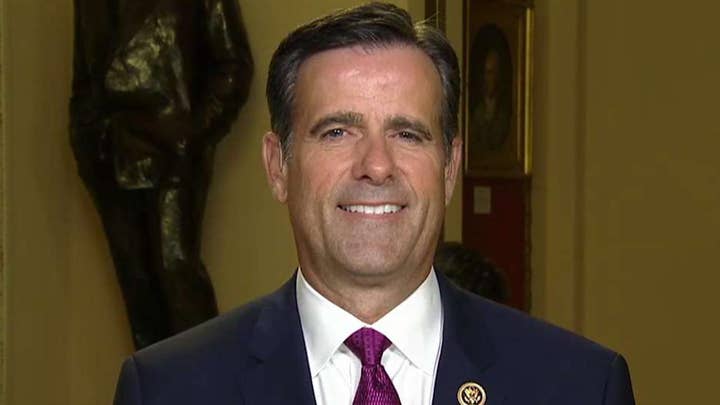Mueller agrees to testify on Capitol Hill, but could the subpoena backfire on Democrats?
A former U.S. attorney says the special counsel won't respond the way Democrats are hoping for on the Russia investigation.
Democrats are eagerly awaiting the chance to question former Special Counsel Robert Mueller on his findings from the Russia investigation, but the timing of the sweltering summer hearings could give those same lawmakers reason to sweat.
Mueller is scheduled to appear before the House Judiciary and Intelligence committees on July 17. There is a more than reasonable chance that by that time, the Justice Department inspector general could release his highly anticipated report on the FBI’s use of the Foreign Intelligence Surveillance Act (FISA) system in the early stages of the Russia probe.
If that happens, President Trump's Republican allies who have long alleged FBI abuses as part of that process are sure to weaponize the report going into the hearings -- and could be poised to turn the tables on majority Democrats.
The president himself signaled his interest in that line of questioning in reacting to the Mueller hearing news in an interview Wednesday on Fox Business Network's "Mornings with Maria."
"They got caught and they're running around going wild trying to do everything they can, but they spied on my campaign, it's as simple as that," Trump said, referring to the probe's origins at the FBI. "It's so illegal, it's probably the biggest political scandal in history and they got caught doing it."

The FBI used a FISA warrant to monitor former Trump campaign adviser Carter Page, but Republicans claim they acquired the warrant under false pretenses. Rep. Devin Nunes, R-Calif., insists that the FBI improperly relied on the unverified dossier compiled by former British spy Christopher Steele as part of opposition research funded by the Clinton campaign. Nunes is on the Intelligence Committee, and would have the opportunity to ask Mueller about this directly.
Rep. John Ratcliffe, R-Texas, a member of both committees, said he has read the FBI’s unredacted warrant applications and claims they relied heavily on the Steele dossier, which he has described as “false and fake.”
“The question is, 'was there a proper predicate?’" Ratcliffe told Fox News' Laura Ingraham in April.
Ratcliffe, a former federal prosecutor, will now get the opportunity to ask this question to Mueller as well, and the IG report may provide fodder for more targeted questioning. Related subjects that GOP committee members could bring up are precisely what led to the launching of the probe, and at what point in the two-year investigation did Mueller realize he did not have the evidence to show an illegal conspiracy between the Trump campaign and Russia.
Rep. Matt Gaetz, R-Fla., is on the Judiciary Committee and he told Fox News’ Shannon Bream on Tuesday that he is interested in asking Mueller about how former FBI special agent Peter Strzok and attorney Lisa Page were brought onto the investigative team, despite both having worked on the Hillary Clinton email probe. “That’s not something you would normally see,” Gaetz said. He also pointed to the appearance of a general Democratic-leaning among the members of Mueller’s team.
“We have legitimate questions about how all these people ended up on the Mueller team that had a history of donating financially to Democrats and there didn’t seem to be sufficient balance,” Gaetz said while acknowledging that there could be “reasonable answers to those questions.”
DEVIN NUNES: CHRISTOPHER STEELE MUST BE INTERVIEWED BY DOJ TO ANSWER QUESTIONS ON ANTI-TRUMP DOSSIER
Other Republicans primed to ask tough questions include Rep. Doug Collins, R-Ga., top Republican on the Judiciary panel, and Rep. Jim Jordan, R-Ohio.
“Bob Mueller better be prepared," Rep. Mark Meadows, R-N.C., a leader of the conservative House Freedom Caucus, told Ingraham. "Because I can tell you, he will be cross-examined for the first time and the American people will start to see the flaws in his report."
Democrats, meanwhile, are hoping to use the hearing to pry additional details from Mueller, about the president's possible Russia ties and more.
“Robert Mueller has agreed to testify before Congress pursuant to subpoena,” Intelligence Committee Chairman Adam Schiff, D-Calif., tweeted late Tuesday. “Russia attacked our democracy to help Trump win. Trump welcomed and used that help. As Mueller said, that should concern every American. And now, every American will get to hear directly from Mueller.”
Schiff has previously outlined the avenues of questioning he would intend to pursue with Mueller at the witness stand – and made clear he would press for detailed answers despite the former special counsel’s stated reluctance to testify.
“It's not enough merely to speak for 10 minutes and say, 'I'm not going to answer questions for Congress and the American people.' There are a great many things that are not in the report,” he told ABC’s “This Week” earlier this month. "We want to find out what happened to those counterintelligence findings that were sent back to headquarters. And in terms of if the president is vulnerable of influence from Russia."
Those statements came after Mueller said in late May, in his first public remarks in more than two years, "The report is my testimony." He further said that if he were to be called to speak under oath, he would not say anything other than what is already in his report.
The Mueller report did not find evidence of a criminal conspiracy between Trump associates and Russia – and while it did not reach a conclusion on whether the president obstructed justice, Attorney General Bill Barr determined there was not enough evidence to support such a case.
But the report detailed numerous incidents that were reviewed as part of the obstruction inquiry, including an allegation that Trump sought to have Mueller removed, as well as contacts between Russian officials and Trump associates. Schiff, in a statement in late May, cited those “countless contacts” as he began more aggressively calling for Mueller’s testimony.
Fox News' Greg Wilson contributed to this report.







